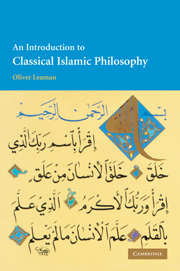Introduction
Published online by Cambridge University Press: 05 June 2012
Summary
Although this book is in no way a guide to the religion and history of Islam itself, it is as well to consider some of the main aspects of that religion before discussing the contribution which philosophy sought to make to it. We might naturally start by considering Muḥammad, the son of ‘Abd Allah and Amīna, a member of the tribe of Quraish, who was born in Mecca in the late sixth century ce. Although his parents were of distinguished lineage, they were far from wealthy, and Muḥammad's father died before his son's birth while his mother died when he was about six years old. He was brought up first by his grandfather and later by his uncle, and spent a great deal of time as a youth and young man in the hills which are near to Mecca guarding his family's flocks of sheep. His fortunes improved when in his mid-twenties he married an older and wealthy widow, whose business affairs he came to manage. Yet it is said that he often spent time alone in the hills of his youth to consider the tribal warfare which caused such great loss of life in Arabia and the idolatry and loose behaviour which prevailed in the local towns. When he was about forty years old he started to hear a voice, interpreted as coming from the angel Gabriel, which commanded him to recite the revelations which were thus made to him.
- Type
- Chapter
- Information
- An Introduction to Classical Islamic Philosophy , pp. 1 - 38Publisher: Cambridge University PressPrint publication year: 2001



